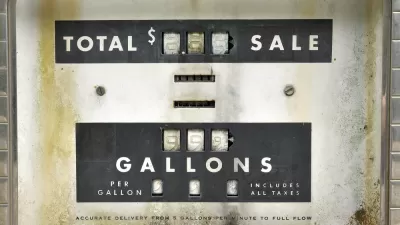With booming shale oil production in North Dakota and Texas and possibly Canada's vast oil sands, there is talk of energy independence as the U.S. reduces its oil imports. But why not be less dependent on oil - domestic or imported?
With vastly increased oil production in the North America and reduced oil consumption by America's passenger fleet, analysts are forecasting (PDF, pg. 1) that the U.S. will become the world's top oil producer by 2017 and could become an oil exporter by 2030, as Elisabeth Rosenthal wrote back on Nov. 12.
Indeed, as was noted here in regards to the Keystone XL pipeline, Texas refineries lining the Gulf of Mexico already export 60% of their gasoline. But is all this talk of finally achieving Project Independence - the dream of all presidents since the 1973 oil embargo - focused on the wrong form of independence?
Fast-forward to March 23, and Rosenthal asks in this news analysis why we can't reduce our dependence on fossil fuels as other countries have done.
People convinced that America “needs” the oil that would flow south from Canada through the Keystone XL pipeline might be surprised to learn that Canada produced 63.4 percent of its electricity from renewable sources in 2011, largely from hydropower and a bit of wind. (Maybe that is why Canada has all that oil to sell.) The United States got only 12.3 percent of its electricity from renewables in 2011. Still, many experts say that aggressively rebalancing the United States’ mix of fossil fuel and renewable energy to reduce its carbon footprint may well be impractical and unwise for now.
She points to a Stanford University proposal "showing how New York State — not windy like the Great Plains, nor sunny like Arizona — could easily produce the power it needs from wind, solar and water power by 2030."
“It’s absolutely not true that we need natural gas, coal or oil — we think it’s a myth,” said Mark Z. Jacobson, a professor of civil and environmental engineering and the main author of the study [PDF], published in the journal Energy Policy. “You could power America with renewables from a technical and economic standpoint. The biggest obstacles are social and political — what you need is the will to do it.”
However, oil is necessary to power the nation's cars, trucks, trains, planes, and ships - can we reasonably expect to free the transportation sector from oil?
Rosenthal points to the "National Research Council report released last week concluded that the United States could halve by 2030 the oil used in cars and trucks compared with 2005 levels by improving the efficiency of gasoline-powered vehicles and by relying more on cars that use alternative power sources, like electric batteries and biofuels." [Summarized here].
However, as The Daily Climate noted on the NRC report, the chances of meeting those goals are unlikely at best.
The news analysis touts the virtues of renewable wind and solar power but neglects the transportation sector's dependency on oil - be it of the imported or domestic variety. Until America's motor vehicles can run on a fuel other than oil - be it electric (battery or fuel cell), bio-fuel, or natural gas, the goal of eliminating oil imports will dominate over independence from oil.
FULL STORY: NEWS ANALYSIS Life After Oil and Gas

Planetizen Federal Action Tracker
A weekly monitor of how Trump’s orders and actions are impacting planners and planning in America.

Maui's Vacation Rental Debate Turns Ugly
Verbal attacks, misinformation campaigns and fistfights plague a high-stakes debate to convert thousands of vacation rentals into long-term housing.

San Francisco Suspends Traffic Calming Amidst Record Deaths
Citing “a challenging fiscal landscape,” the city will cease the program on the heels of 42 traffic deaths, including 24 pedestrians.

Defunct Pittsburgh Power Plant to Become Residential Tower
A decommissioned steam heat plant will be redeveloped into almost 100 affordable housing units.

Trump Prompts Restructuring of Transportation Research Board in “Unprecedented Overreach”
The TRB has eliminated more than half of its committees including those focused on climate, equity, and cities.

Amtrak Rolls Out New Orleans to Alabama “Mardi Gras” Train
The new service will operate morning and evening departures between Mobile and New Orleans.
Urban Design for Planners 1: Software Tools
This six-course series explores essential urban design concepts using open source software and equips planners with the tools they need to participate fully in the urban design process.
Planning for Universal Design
Learn the tools for implementing Universal Design in planning regulations.
Heyer Gruel & Associates PA
JM Goldson LLC
Custer County Colorado
City of Camden Redevelopment Agency
City of Astoria
Transportation Research & Education Center (TREC) at Portland State University
Jefferson Parish Government
Camden Redevelopment Agency
City of Claremont



























